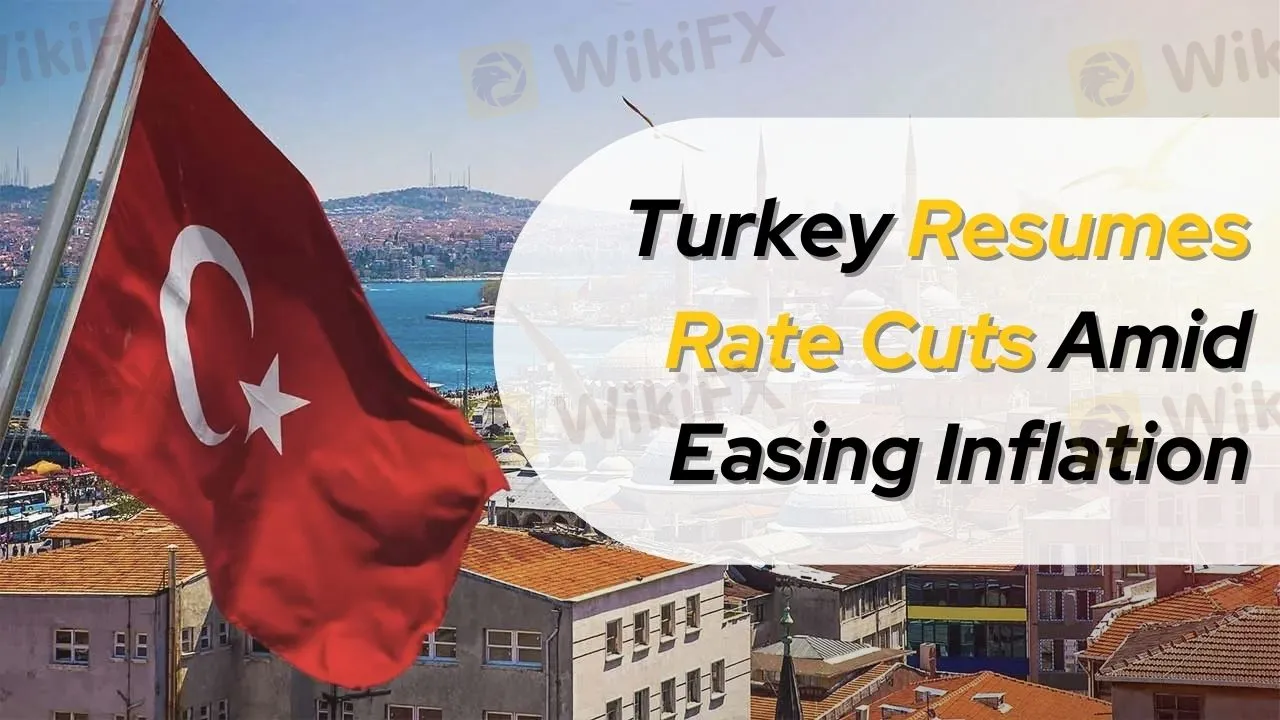简体中文
繁體中文
English
Pусский
日本語
ภาษาไทย
Tiếng Việt
Bahasa Indonesia
Español
हिन्दी
Filippiiniläinen
Français
Deutsch
Português
Türkçe
한국어
العربية
Turkey Resumes Rate Cuts Amid Easing Inflation
Abstract:Turkey’s inflation has eased, prompting the central bank to resume interest rate cuts. Striking a balance between economic recovery and inflation control has become a critical focus. However, significant challenges lie ahead, as Turkey continues to navigate complex economic conditions.

In December 2024, Turkey‘s annual inflation rate dropped from 47.1% in November to 44.4%, with monthly inflation significantly declining from 2.24% to 1.03%. While inflation remains high, the downward trend has opened opportunities for policy adjustments. On December 26, the Turkish central bank announced a 250-basis-point rate cut, lowering the benchmark one-week repo rate from 50% to 47.5%. This marks Turkey’s first rate cut in nearly two years, aimed at reducing financing costs and stimulating economic activity. Although the central bank maintained a cautious tone, stating that future easing may not continue at the same pace, markets widely expect this move to signal the start of a series of rate cuts.
Policy and Economic Outlook for 2025
Turkish President Recep Tayyip Erdoğan has stated unequivocally that interest rates will “definitely” be further reduced in 2025. This reflects his continued support for loose monetary policies as a tool for promoting economic growth. Market analysts predict that the Turkish central bank may continue to cut rates in upcoming policy meetings, with potential reductions of 250 basis points per session. However, further declines in inflation will be a critical prerequisite for such policy adjustments. Recent government fiscal measures, such as a 30% increase in the minimum wage, could influence consumer demand and overall price levels, though their impact remains to be seen.
Economic Challenges Facing Turkey
Despite the easing of inflation, Turkey‘s economy continues to face significant challenges. High inflation has severely impacted the quality of life for ordinary citizens, with real purchasing power declining sharply. Additionally, the persistent depreciation of the Turkish lira has kept import prices high, exacerbating inflationary pressures. In the third quarter of 2024, Turkey’s economy entered a technical recession, with high interest rates and financing costs suppressing corporate investment and economic vitality. Furthermore, global economic slowdowns and geopolitical uncertainties have added to Turkeys external pressures.
At the same time, policy uncertainty remains a major concern. Frequent policy shifts and presidential interference in monetary policy have raised doubts about the central banks independence, heightening the risk of capital outflows. These challenges underline the complexity of balancing economic recovery and inflation control while ensuring long-term economic stability.
Disclaimer:
The views in this article only represent the author's personal views, and do not constitute investment advice on this platform. This platform does not guarantee the accuracy, completeness and timeliness of the information in the article, and will not be liable for any loss caused by the use of or reliance on the information in the article.
Read more

Forex Interbank Rate & How It Influences Your Trading
A forex interbank rate is nothing but the wholesale currency exchange rate that banks and other major financial institutions use to trade currencies among themselves. Read more about it.

Gold Rate Today in Mumbai and Other Updates on Your Fingertips
After correcting for two straight days, gold rebounded on June 26, 2025, across 24 Karat and 22 Karat categories in Mumbai, the financial capital of India. Check out the latest price update.

CPI Inflation Eased to 2.82% in May 2025 - Check Out the Items Whose Prices Have Fallen
The Consumer Price Index (CPI) inflation dropped to a six-year low of 2.82% in May 2025, falling from 3.16% a month ago. Read this to know the extent of fall across food and non-food items.

Gold & Silver Prices Breach INR 1 Lakh in India - Check Out the Stunning Reasons
India’s bullion market is setting new records with both gold and silver prices breaching the INR 1-lakh mark in spot markets. Read this guide to know the factors that drive the bullion market crazy.
WikiFX Broker
Latest News
America's Deficit Reckoning: How the U.S. debt spiral could spark a crisis
Treasury yields hold steady as Trump extends tariff deadline
Gold Prices to Fluctuate This Week Amid July 9 Tariff Deadline, Fed Policy
Goldman Sachs revamps Fed interest rate cut forecast for 2025
Forex Hedging: Is It a Trader’s Safety Net or Just an Illusion?
OPEC+ members agree larger-than-expected oil production hike in August
Top Wall Street analysts are pounding the table on these 3 stocks
Stock futures fall after Trump team says tariffs will go into effect on Aug. 1: Live updates
FCA clarifies expectations on bullying, harassment and violence to deepen trust in financial service
Asia-Pacific markets mixed after Trump shifts goalposts on tariffs again
Currency Calculator


